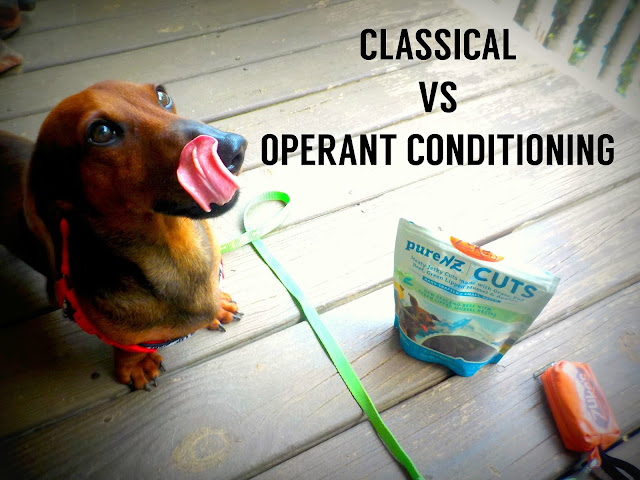classical vs operant conditioning
Today I'll be going over classical and operant conditioning and how it is applied to dog training. They both may sound similar, but they're actually quite different. Take a minute to look at these loose definitions of both theories.
Classical (aka Pavlovian) Conditioning: Named after Ivan Pavlov's iconic experiment, Classical Conditioning involves your dog displaying a certain behavior due to a trigger your dog understands the result of.
Operant Conditioning: Operant Conditioning is the base of all dog training and determines a dog's behavior depending on previous rewards and punishments received with that stimulant present.
These types of conditioning are obviously important as they are applied in many forms of dog training. How do they play out with your pooch you may be asking? Here is an example from each.
Example of Classical (aka Pavlovian) Conditioning: Your dog runs to the door and whines for you to stay when he hears your keys jingle. He does not naturally know what keys are or what their jingling means, but through repitition he knows what the stimulant means and what it results in.
Example of Operant Conditioning: You scold your dog every time he chews your slippers. Eventually, even if you simply put your slippers on, your dog will cower and avoid you. He doesn't understand you're not doing anything that involves him, he just remembers the slipper was there when you scolded him.
Okay, now how are these principles useful in dog training? Here's an example of each.
Example of Classical (aka Pavlovian) Conditioning: Your dog knows that every time he hears the clicker (considering you clicker train) he receives a treat, so anticipating the treat he might stare at you, salvitate, whine, or sit among other things.
Example of Operant Conditioning: When your dog doesn't show self-control and consumes a treat even when you give the command "leave it", you take the treat and gently say "no". He associates giving into temptation with the gentle punishment and now avoids making the mistake again.
That's all for now! I hope this article has given you a better understanding of classical and operant conditioning!
Operant Conditioning: Operant Conditioning is the base of all dog training and determines a dog's behavior depending on previous rewards and punishments received with that stimulant present.
These types of conditioning are obviously important as they are applied in many forms of dog training. How do they play out with your pooch you may be asking? Here is an example from each.
Example of Classical (aka Pavlovian) Conditioning: Your dog runs to the door and whines for you to stay when he hears your keys jingle. He does not naturally know what keys are or what their jingling means, but through repitition he knows what the stimulant means and what it results in.
Example of Operant Conditioning: You scold your dog every time he chews your slippers. Eventually, even if you simply put your slippers on, your dog will cower and avoid you. He doesn't understand you're not doing anything that involves him, he just remembers the slipper was there when you scolded him.
Okay, now how are these principles useful in dog training? Here's an example of each.
Example of Classical (aka Pavlovian) Conditioning: Your dog knows that every time he hears the clicker (considering you clicker train) he receives a treat, so anticipating the treat he might stare at you, salvitate, whine, or sit among other things.
Example of Operant Conditioning: When your dog doesn't show self-control and consumes a treat even when you give the command "leave it", you take the treat and gently say "no". He associates giving into temptation with the gentle punishment and now avoids making the mistake again.
That's all for now! I hope this article has given you a better understanding of classical and operant conditioning!

Comments
Post a Comment